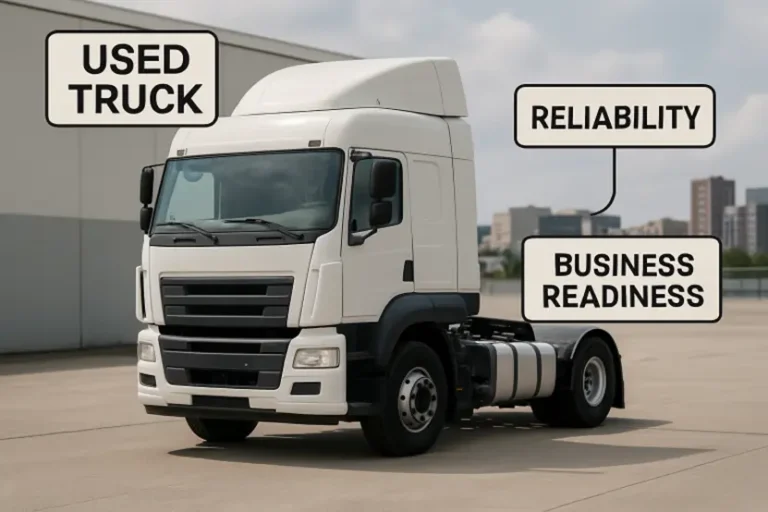Introduction
For businesses in today’s fast-moving logistics sector, efficiency and adaptability are more important than ever. A growing number of companies are finding that Used Trucks not only offer a practical solution to logistical challenges but also provide the flexibility to address changing customer demands while remaining cost-effective. Used trucks offer businesses the opportunity to scale up their fleet with reliable vehicles at a fraction of the price of new models, helping large and small enterprises stay competitive in a rapidly evolving market.
Access to high-quality used trucks translates into improved delivery times and optimized routes, especially for companies operating on tight budgets or expanding into new regions. The current marketplace for used trucks in the transportation industry is robust, with innovations in diagnostics and telematics making even pre-owned fleet options highly attractive. Used trucks have become a cornerstone of operational strategy for companies looking for affordable options that do not sacrifice reliability or safety.
Cost-Effectiveness of Used Trucks
Purchasing used trucks is a strategic move that offers significant financial benefits. Businesses gain access to reliable and well-maintained vehicles at a much lower upfront cost compared to buying new. This enables companies to allocate resources toward growth initiatives, employee training, or fleet upgrades, without overextending budgets. Cost savings continue long after the initial purchase, with lower insurance premiums and slower depreciation rates than new vehicles often experience. Investing in used trucks offers the perfect balance of performance, dependability, and budgetary efficiency for growing small to medium-sized enterprises.
Reliability and Maintenance
The durability of modern trucks has dramatically increased, making many used models a wise choice for ongoing operations. Advances in engineering mean that a truck’s useful lifespan easily extends past the initial lease or ownership period. Routine preventive maintenance and the wide availability of OEM and aftermarket parts keep maintenance costs predictable and manageable. Professional trucking companies and experienced mechanics can quickly handle routine upkeep, while established service networks often provide manufacturers’ certified inspections for used vehicles.
Technological Advancements in Used Trucks
The used truck market boasts vehicles with advanced features such as real-time GPS tracking, integrated telematics systems, and driver-assist technologies. Even pre-owned trucks now often come with factory-installed or upgraded telematics, enabling fleet managers to optimize fuel consumption, monitor vehicle health, and streamline delivery schedules. These tools help operators minimize downtime, boost operational efficiency, and deliver better customer service. According to Forbes, integrating telematics and innovative diagnostics is becoming a standard across fleets, even for older vehicles, resulting in smarter, more connected operations.
Environmental Considerations
Opting for used trucks can significantly reduce your business’s environmental impact. By extending the usable lifespan of existing vehicles, companies lower demand for new manufacturing, which helps conserve resources and decrease greenhouse gas emissions. Many used trucks can be retrofitted with advanced emissions control systems or updated engines to comply with modern sustainability standards. Initiatives from environmental agencies suggest that such retrofits and the prolonged use of vehicles contribute to more responsible supply chain practices. For more on evolving environmental standards and truck fleet sustainability, AP News provides a deeper look at regulations affecting the commercial fleet sector.
Meeting Diverse Business Needs
The flexibility of used trucks allows companies across industries to tailor their fleets to specific operational requirements. Whether your business needs a heavy-duty vehicle for long-haul routes, a fuel-efficient model for local deliveries, or a specialty truck for unique cargo, the breadth of choices in the used market ensures a precise fit. Businesses can choose from various configurations, allowing for quick fleet scaling or adjustment to new distribution channels without waiting for the long lead times standard in new vehicle orders. This adaptability helps organizations stay responsive amid shifting consumer trends or seasonal fluctuations.
Navigating Regulatory Landscapes
Complying with transportation regulations is a reality for all logistics operators, and many used trucks already come equipped to meet established emission and safety requirements. Where updates are necessary, simple upgrades or modifications can bring vehicles up to code, ensuring business continuity. Regularly monitoring changes in state and federal laws and maintaining an adaptable fleet allows businesses to respond to evolving policies without major disruptions or unscheduled expenses. Government resources and industry publications, such as those offered by the Federal Motor Carrier Safety Administration, can help fleet managers stay up-to-date with the latest developments.
Future Outlook
Integrating new technologies, environmental commitments, and the continual improvement of vehicle engineering means the future for used trucks remains bright. As autonomous and semi-autonomous features trickle down into the used truck market, along with advanced analytics and remote diagnostics, businesses that incorporate used trucks into their fleets stand to gain efficiency and cost savings. The blend of affordability, adaptability, and innovation will continue to make used trucks a vital asset for companies navigating the complexities of the modern transportation landscape.
